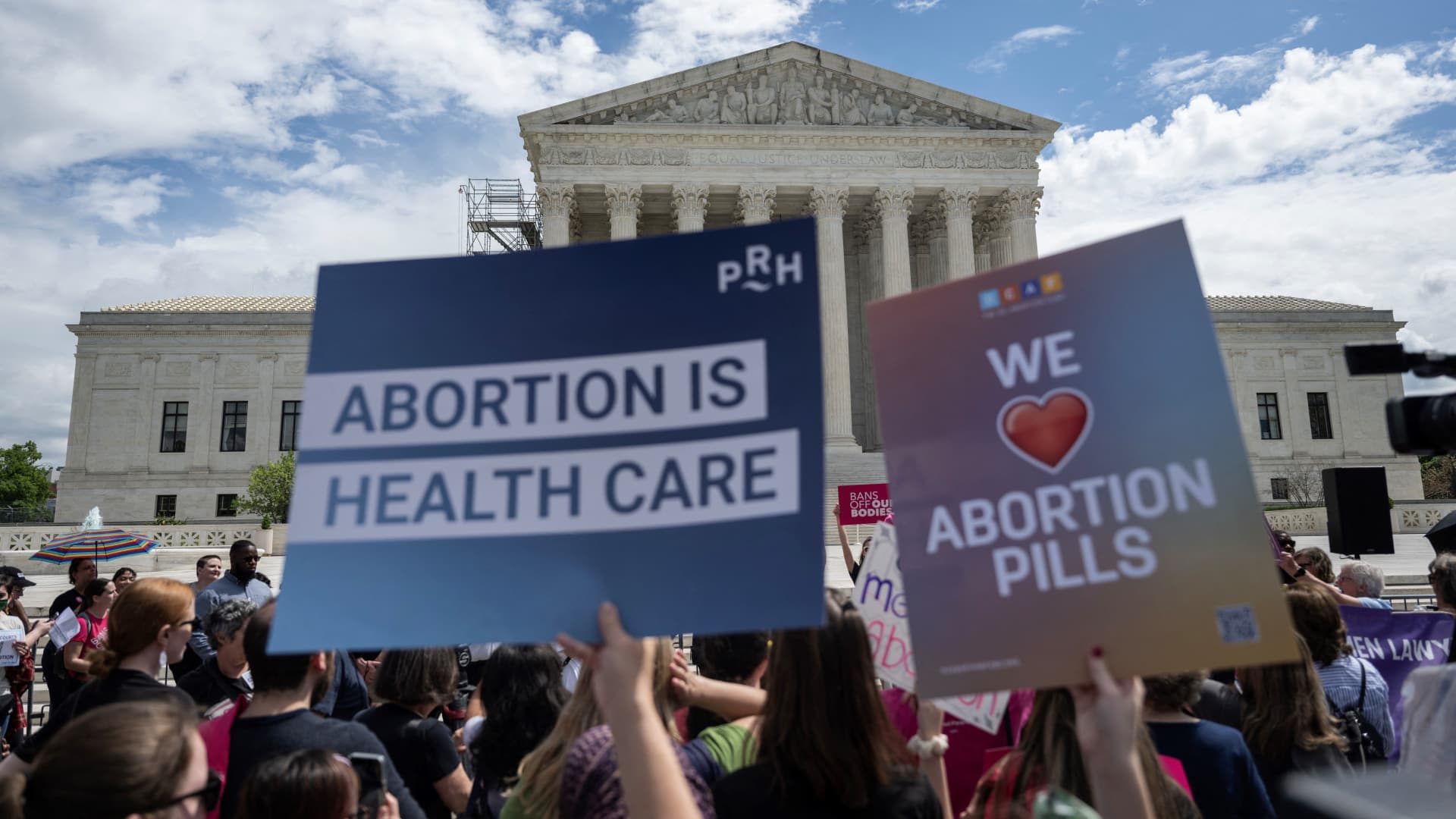
Demonstrators rally in support of abortion rights at the US Supreme Court in Washington, DC, April 15, 2023.
Andrew Caballero-Reynolds | AFP | Getty Images
Supreme Court Justice Samuel Alito on Wednesday issued an order allowing the abortion pill mifepristone to remain available by mail delivery and without tighter restrictions on how it is used until at least late Friday night.
Alito last week had temporarily blocked the restrictions on mifepristone imposed by lower federal courts until 11:59 p.m. Wednesday in response to an emergency motion by the Justice Department and Danco Laboratories, the distributor of the brand name version of the drug Mifeprex.
Those restrictions now will remain on hold until 11:59 p.m. Friday as a result of his new order.
Alito did not explain the reason for the delay.
But it gives him and the rest of the Supreme Court two days more to consider whether to maintain the hold on the lower court rulings, or to allow restrictions on mifepristone to take effect as a complicated legal battle over the drug plays out.
Two separate federal courts have given the Food and Drug Administration conflicting rulings on the availability of the medication.
U.S. Judge Matthew Kacsmaryk of the Northern District of Texas earlier this month suspended the FDA approval of mifepristone and all subsequent decisions the agency had taken to regulate the medication.
The U.S. Fifth Circuit Court of Appeals partially blocked Kacsmaryk’s sweeping order days later and kept the FDA approval in effect, but imposed severe limits on how mifepristone is used and distributed. Although that ruling keeps mifepristone on the market, the restrictions are so sweeping that many women would not have access to the medication even in some states where abortion is legal.
Shortly after Kacsmaryk’s ruling, U.S. Judge Thomas Rice of the Eastern District of Washington state barred the FDA from restricting the availability of mifepristone in 17 states and Washington D.C.
Mifepristone, used in combination with another drug called misoprostol, is the most common method to terminate a pregnancy in the U.S., accounting for about half of all abortions, according to the Centers for Disease Control and Prevention and the Guttmacher Institute.
Kacsmaryk’s unprecedented ruling was the first time a federal court invalidated an FDA determination that a drug is safe and effective, according to court filings from the Justice Department, former FDA officials and the pharmaceutical industry.
Former President Donald Trump appointed Kacsmaryk. Senate Democrats unanimously opposed his nomination over concerns about his position on abortion and LGBTQ rights.
The appeals court restrictions included blocking mail delivery of the medication, re-imposing doctor visits as a requirement to obtain the drug, and shortening the length of time women can use the pill to the seventh week of pregnancy. The court also blocked the generic version of mifepristone made by a second company, GenBioPro, which supplies about two-thirds of the medication for the U.S. market.
The 5th Circuit decision by Judges Kurt Engelhardt and Andrew Oldham, who were also appointed by Trump, essentially rolled back all the actions the FDA had taken to make mifepristone easier for women to access.
The Justice Department told the Supreme Court that complying with the 5th Circuit decision would put the government in violation of Rice’s order preserving access in 18 jurisdictions.
The Alliance Defending Freedom, the anti-abortion group that filed the lawsuit against the FDA’s approval of mifepristone, asked the Supreme Court keep the restrictions on the medication in place. It argued that the limits provide important protections that keep patients safe. The legal organization represents a group of doctors who oppose abortion called the Alliance for Hippocratic Medicine.
The Alliance Defending Freedom says it helped draft the Mississippi law that ultimately led the Supreme Court last summer to overturn Roe v. Wade, the landmark 1973 decision that guaranteed abortion as a constitutional right nationwide. The group says it is dedicated “to protecting religious freedom, free speech, the sanctity of life, parental rights, and God’s design for marriage and family.”
The Justice Department and Danco said the lower court rulings would basically take mifepristone off the market for months as the FDA adjusts the medication’s labelling to comply with the appeals court order. This would deny many women access to an FDA-approved drug that is a safe and effective alternative to surgical abortions, they argued.
The anti-abortion groups have claimed that the manner in which the FDA approved mifepristone was illegal, and argued that the drug is not safe. Those claims are strongly disputed by former FDA officials, leading medical associations, the pharmaceutical industry, 23 U.S. states and hundreds of members of Congress.
They say the FDA conducted a rigorous review that determined mifepristone is safe and effective, which has been confirmed by decades of subsequent data.
A group of drugmakers that included Pfizer, biotech executives and investors told the Supreme Court that allowing the lower court rulings to stand would “shatter the FDA’s gold standard of scientific safety and efficacy review.” Former FDA officials told the high court that the rulings would effectively create open season on the agency, allowing competing drug companies or anyone who claims to have had a side effect from a medication to sue to take treatments off the market.











